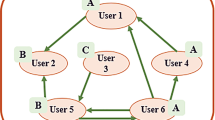Summary
Social networks study revealed several useful properties, as the small world effect; such networks can be exploited in addressing the question of trusting, which has become a crucial matter inside Internet-based communities. This paper presents such an approach aiming at reproducing the behaviour individuals adopt in their life when they establish and maintain trust relationships, sending queries to collect reputations in order to estimate how much trust in new acquaintances. We consider issues as query network forwarding and lifecycle of trusting relationships, aiming at building an effective and efficient model for trust management
Access this chapter
Tax calculation will be finalised at checkout
Purchases are for personal use only
Preview
Unable to display preview. Download preview PDF.
Similar content being viewed by others
References
Donovan Artz and Yolanda Gil. A survey of trust in computer science and the semantic web. journal of Web Semantics, (to appear), 2007.
Matteo Dell’Amico. Neighbourhood maps: Decentralised ranking in small-world p2p networks. In 3rd International Workshop on Hot Topics in Peer-to-Peer Systems (Hot-P2P), Rhodes Island, Greece, April 2006.
M. Deutsch. Cooperation and trust, some theoretical notes. In Nebraska University Press, editor, Nebraska Symposium on MOtivation, 1962.
J. Golbeck. Trust and nuanced profile similarity in online social networks.
J. Golbeck and J. Hendler. Reputation network analysis for email filtering, 2004.
Sepandar D. Kamvar, Mario T. Schlosser, and Hector Garcia-Molina. The eigentrust algorithm for reputation management in p2p networks, 2003.
Michael Kinateder and Siani Pearson. A Privacy-Enhanced Peer-to-Peer Reputation System. In K. Bauknecht, A. M. Tjoa, and G. Quirchmayr, editors, Proceedings of the 4th International Conference on Electronic Commerce and Web Technologies (EC-Web 2003), volume 2738 of LNCS, pages 206–215, Prague, Czech Republic, September 2003. Springer-Verlag.
Paolo Massa and Bobby Bhattacharjee. Using trust in recommender systems: An experimental analysis. In Christian Damsgaard Jensen, Stefan Poslad, and Theodosis Dimitrakos, editors, iTrust, volume 2995 of Lecture Notes in Computer Science, pages 221–235. Springer, 2004.
Merriam-Webster. http://www.m-w.com.
Miquel Montaner, Beatriz Lopez, and Josep Lluis de la Rosa. Opinion-based filtering through trust. In CIA ’02: Proceedings of the 6th International Workshop on Cooperative Information Agents VI, pages 164–178, London, UK, 2002. Springer-Verlag.
Lawrence Page, Sergey Brin, Rajeev Motwani, and Terry Winograd. The pagerank citation ranking: Bringing order to the web. Technical report, Stanford Digital Library Technologies Project, 1998.
P. Sztompka. Trust: A sociological theory. 1999.
Cai-Nicolas Ziegler and Jennifer Golbeck. Investigating correlations of trust and interest similarity - do birds of a feather really flock together? Decision Support System, (to appear), 2005.
Author information
Authors and Affiliations
Editor information
Editors and Affiliations
Rights and permissions
Copyright information
© 2008 Springer-Verlag Berlin Heidelberg
About this paper
Cite this paper
Carchiolo, V., Longheu, A., Malgeri, M., Mangioni, G., Nicosia, V. (2008). Applying Social Behaviours to Model Trusting. In: Badica, C., Paprzycki, M. (eds) Advances in Intelligent and Distributed Computing. Studies in Computational Intelligence, vol 78. Springer, Berlin, Heidelberg. https://doi.org/10.1007/978-3-540-74930-1_11
Download citation
DOI: https://doi.org/10.1007/978-3-540-74930-1_11
Publisher Name: Springer, Berlin, Heidelberg
Print ISBN: 978-3-540-74929-5
Online ISBN: 978-3-540-74930-1
eBook Packages: EngineeringEngineering (R0)




